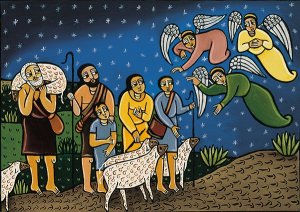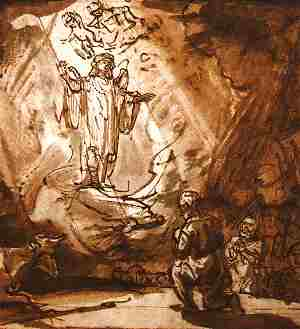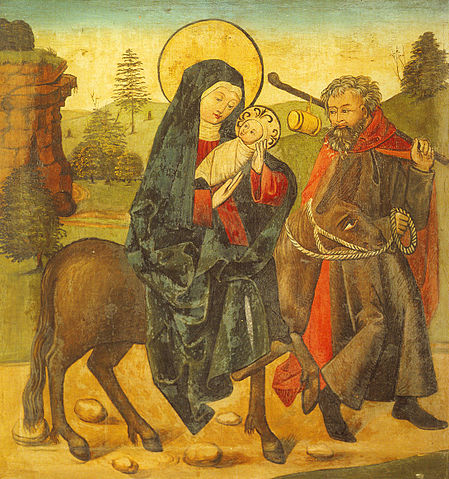“To Practice Joy!”

Luke 2:1-14 (2:10) – December 17, 2023
Have you ever been so busy, so worried, or so focused, that you couldn’t be joyful? Sometimes it feels that way for me. Sometimes, with so much work for the hospice I work for, so many things to do for the small church I pastor – St. Luke’s Church – I feel stretched thin and working hard. Many people I know are head down, sitting in the computer chair, laptop on till late at night. It seems like I cannot find the time to be joyful – to practice joy!
I wonder whether the shepherds on the hills surrounding Bethlehem felt anything like that? I wonder if their livelihood as shepherds – precarious at best – was also problematic, even hectic? I mean, you and I might connect shepherds with idyllic, pastoral scenes, with green pastures and quiet waters flowing gently under a sparkling blue sky. Let me tell you: life as a shepherd in Palestine was not idyllic, not by any means!
Working as a shepherd was truly lurking on the outskirts of Palestinian society, in the first century. We just heard in our reading that the angels brought Good News. The shepherds needed some Good News, too. On those hilltops around Bethlehem, they were not exactly welcome in the general society of the town, either. Focusing on today’s Scripture reading, Dr. Luke tells us about the shepherds, abiding in the fields, keeping watch over their flocks by night. But, he does not mention anything about the low position they held in society.
Let’s come at this miraculous birth announcement from another direction. Yes, the shepherds were keeping watch over their flocks by night, and yes, the divine messenger from heaven bursts upon them, lighting up the sky. The first words out of the angel’s mouth: “Do not be afraid!” I am certain the shepherds were terrified! And then, the angel shares the Good News: ““I bring you good news that will cause great joy for all the people. 11 Today in the town of David a Savior has been born to you; he is the Messiah, the Lord.” The angel’s marvelous news surely would cause great joy for everyone! Wouldn’t it?
Then—before the shepherds have had a chance to digest this incredible announcement—the sky changes again. What had moments ago been silent and dark now roars with sound and flashes with light, a multitude of angels offering praise to God. [1] We can almost hear the angelic chorus in Handel’s Messiah: “Glory to God in the highest!”
I wonder: are you and I ready to rejoice with the shepherds right now? Can we sing with the multitude of angels, praising God and lifting our voices to the skies? Or, would we be terrified, along with the shepherds, at the Good News of great joy that the angel brought?
Let’s think some more about those shepherds. “By the time of Jesus, shepherding had become a profession most likely to be filled from the bottom rung of the social ladder, by persons who could not find what was regarded as decent work. Society stereotyped shepherds as liars, degenerates, and thieves. The testimony of shepherds was not admissible in court, and many towns had ordinances barring shepherds from their city limits.” [2]
Imagine the difference in class between the shepherds and the bulk of the townspeople of Bethlehem. Certain people live “on the wrong side of the tracks,” or “on the other side of town.” Perhaps they come from the “low-class hill country,” or “that sketchy place down by the river.”
Yet, God revealed the great Good News of the Messiah’s birth to these lowly, no-count shepherds! Imagine, angels – God’s heavenly messengers – came to these people on the bottom rung of the social ladder, not to the president of the biggest synagogue in Bethlehem, and not to the most respected Rabbi in town.
The Gospel of Luke is a gospel centered on “a connection to the marginalized, the lowly, and the common and often unacceptable people of first century Judea that will be present throughout Jesus’ life and ministry. It reminds us that these are the very people who Jesus will invite to be part of the Kingdom of God.” [3] This stunning heavenly birth announcement came to the outsiders, people on the margins. In modern-day terms, God’s heavenly birth announcement comes to the homeless, people selling Streetwise or begging at street corners, migrants, people in tent camps, to lonely seniors, and children of teenaged mothers.
It truly does not matter – you and I can spread the Good News to everyone we meet, too.
The angels did not observe the class consciousness of society, or the language barriers or color barriers of so much of our world. No! The angels sent from God brought glad tidings of great joy to ALL the people. Not just some select few, not even to most of the earth’s population. No! This Good News came to ALL the people. It comes to all with an emotional, mental, or spiritual disconnect, too!
The angels came to the “fields of the isolated, the disenfranchised and the forgotten, or in our own painful places of spiritual wilderness, because God speaks the good news of Christ’s coming there. God brings great joy to those who need it most there.” [4]
I realize that it can take a tremendous amount of emotional energy to navigate each day’s difficulties. Each day’s challenges can sap each one of us of strength to continue. So, “joy” can seem like a luxury, something that is almost unattainable. Yet, such joy is a gift. God brings joy to each of us, to lighten our hearts and brighten our souls. “We practice what we might have a knack for but want to get better at: drawing, soup-making, karate. We practice what we’re good at and know we’ll lose if we don’t keep at it: yoga, math, courage. Could joy fall into that category? Could we practice delighting in some piece of each new day, meeting each new person with wonder, treasuring each connection?” [5]
God wishes to draw ALL of us in to the Good News of the birth of God’s Son. Regardless of where we come from, or where we are right now, we receive great joy. Each one of us has the angel of the Lord bringing Good News to us—personally. Glad tidings of great joy, no matter what! Wonderful news, any time we need it! Alleluia, amen! m
(Suggestion: visit me at my other blogs: matterofprayer: A Year of Everyday Prayers. #PursuePEACE – and A Year of Being Kind . Thanks!
(I would like to express my great appreciation for the observations and commentary from the Do Not Be Afraid Advent Devotional – © 2022 Illustrated Ministry, LLC.. I used several quotes and ideas from their useful resources. Thanks so much!)
[1] The Do Not Be Afraid Advent Devotional – © 2022 Illustrated Ministry, LLC
[2] http://www.workingpreacher.org/preaching.aspx?commentary_id=1522
[3] https://www.workingpreacher.org/commentaries/revised-common-lectionary/christmas-eve-nativity-of-our-lord/commentary-on-luke-21-14-15-20-12
[4] http://www.workingpreacher.org/preaching.aspx?commentary_id=1522
[5] The Do Not Be Afraid Advent Devotional – © 2022 Illustrated Ministry, LLC








